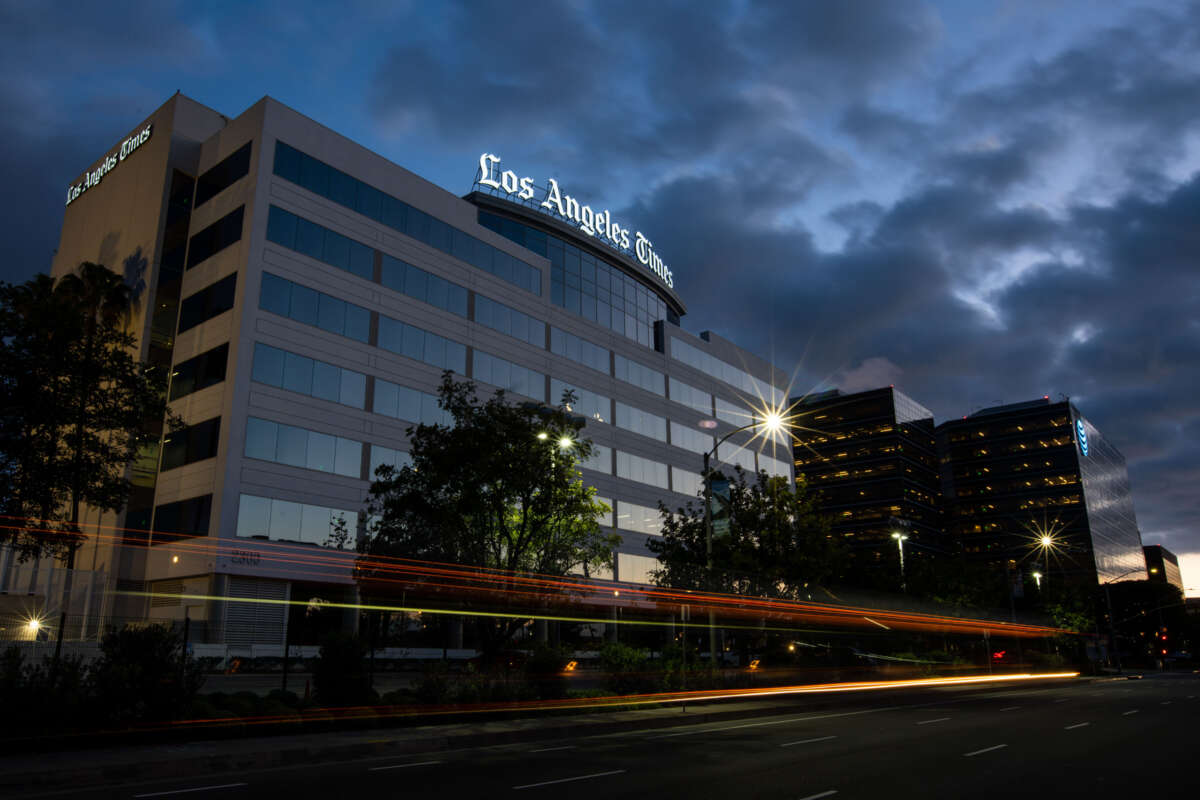The Los Angeles Times (LAT) has banned 38 journalists from covering Gaza for at least three months after they signed an open letter criticizing Western newsrooms for their biased reporting on Israel’s genocide of Palestinians.
“The urgency of this moment cannot be overstated. It is imperative that we change course,” the open letter says.
LAT management claimed that signing the open letter violated the paper’s ethics policy, but the policy contains no explicit prohibition against open letters. While the ethics policy does prohibit staff members from engaging in political advocacy and says that staff should avoid public expressions of their political views, LAT staff have asserted that demanding that newsrooms engage in unbiased coverage is not political.
“This is an issue that has popped up across several newsrooms represented by our local, and our members have, among many issues, raised strong concerns about confusing, inconsistent, opaque and unequal interpretation and enforcement of the rules, especially at LAT,” Matt Pearce, president of the LAT’s parent union, Media Guild of the West, told LA Public Press.
The open letter advocates for media to describe Israel’s actions in Gaza using terms that have been employed by experts, including “ethnic cleansing,” “apartheid” and “genocide.”
“We also hold Western newsrooms accountable for dehumanizing rhetoric that has served to justify ethnic cleansing of Palestinians,” the letter states. “This is our job: to hold power to account. Otherwise we risk becoming accessories to genocide.”
The letter also demands that Western media condemn Israeli forces for killing journalists. According to the Committee to Protect Journalists (CJP), at least 64 journalists and media workers have been killed in Israel’s war on Gaza since December 7, mostly by Israeli airstrikes.
“Journalists across the region are making great sacrifices to cover this heart-breaking conflict,” Sherif Mansour, CPJ’s Middle East and North Africa program coordinator, said in a statement. “Those in Gaza, in particular, have paid, and continue to pay, an unprecedented toll and face exponential threats. Many have lost colleagues, families, and media facilities, and have fled seeking safety when there is no safe haven or exit.”
Out of fear of retaliation from their employers, more than 30 journalists have asked to have their signatures removed since the open letter was published on November 9. As of November 13, 1,484 current and former journalists have signed the letter.
Media workers and unions have been outspoken advocates for unbiased coverage of the genocide in Western media, demanding that media companies condemn the targeted killing of Palestinian journalists.
On October 13, the National Writers Union condemned the actions of the Israeli military “and its specific assault on the press,” and urged the Western media to “cover this war in a factual, unbiased way, and with proper historical context.” In November, media workers calling themselves the “Writers Bloc” staged a sit-in at The New York Times lobby. The media workers read the names of thousands of Palestinians killed in Gaza since the start of Israel’s current military campaign, and scattered editions of a mock newspaper charging the media with “complicity in laundering genocide.”
“It is incredible to see hundreds of writers and journalists take part of this — in this action, because it’s telling us that journalistic malpractice, such as omitting facts and passive voice and denying war crimes and treating the lives of Palestinians as though they are less than, and demonizing and vilifying and dehumanizing Palestinians and Palestinian resistance, is completely unacceptable, if we are going to be truthful and if we are going to be loyal to the rules of this profession we call our own,” said Palestinian journalist and poet Mohammed El-Kurd.
Media workers have faced an unprecedented level of retaliation for speaking out. In October, BBC News Arabic took six of their reporters off the air for liking or publishing pro-Palestine posts on social media, and in November, the media giant Hearst instituted a new social media policy that bans its employees from expressing “personal political opinions” online. Editors at Artforum and eLife have also been fired for supporting Palestinian liberation.
Despite the retaliation media workers have faced, many have refused to back down.
“We are U.S. journalists and media makers calling for a permanent ceasefire, freedom for all Palestinian political prisoners including journalists, and a complete end to the military occupation of Palestine and the system of apartheid in Israel,” reporters wrote for Truthout. “This is a defining political moment of our lives.”
Thank you for reading Truthout. Before you leave, we must appeal for your support.
Truthout is unlike most news publications; we’re nonprofit, independent, and free of corporate funding. Because of this, we can publish the boldly honest journalism you see from us – stories about and by grassroots activists, reports from the frontlines of social movements, and unapologetic critiques of the systemic forces that shape all of our lives.
Monied interests prevent other publications from confronting the worst injustices in our world. But Truthout remains a haven for transformative journalism in pursuit of justice.
We simply cannot do this without support from our readers. At this time, we’re appealing to add 50 monthly donors in the next 2 days. If you can, please make a tax-deductible one-time or monthly gift today.
